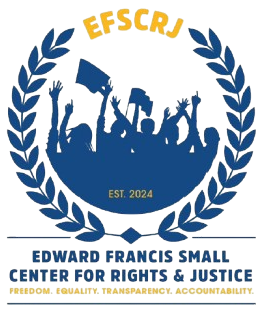Summary of the EFSCRJ Strategic Plan 2025-2029 by Component
Our Strategic Plan is built on five core components, each targeting critical areas of human rights and democratic governance in The Gambia. These components work synergistically to foster an open, just, and equal society.
Freedom
Objective: Protect fundamental freedoms and civil liberties.
Focus Areas: Freedom of expression, media, assembly, association, movement, and worship.
Key Actions:
Advocate legal reforms
Monitor/report violations of rights.
Support civil society and media.
Key Interventions:
Advocate for legal reforms
Monitor and report violations against activists and journalists.
Support independent media through training and legal backing.
Expected Outcomes:
Safer space for activism.
Fewer cases of harassment and arbitrary arrests.
Increased public participation in protests and civic actions.
Stronger legal protections for dissent.
Reduced censorship and harassment.
Equality
Objective: Eliminate discrimination and promote inclusive participation and services.
Focus Areas: Gender, disability, ethnicity, religion, and inclusion of marginalized groups.
Key Interventions:
Conduct awareness campaigns on anti-discrimination policies.
Lobby for equality and inclusion laws.
Promote quotas for marginalized/underrepresented groups in decision-making roles.
Expected Outcomes:
30% increase in representation of marginalized groups in governance.
Reduced tolerance for exclusionary practices.
Enforcement of anti-discrimination laws.
Stronger public support for inclusion.
Passage of equality-focused legislation.
Empowerment
Objective: Enhance civic awareness and grassroots advocacy.
Focus Areas: Civic and voter education, voter participation, and community-led accountability.
Key Interventions:
Train communities on rights awareness and social audits.
Mobilize grassroots movements
Strengthen civil society networks.
Promote participatory governance.
Expected Outcomes:
Higher voter turnout, especially among youth and women.
Increased citizen engagement in governance.
Local campaigns on service delivery and corruption.
More active citizen-led accountability movements.
Expanded civic knowledge and rights awareness.
Transparency
Objective: Promote open governance and access to public information.
Focus Areas: Anti-corruption, government budget/contract transparency, digital rights, election monitoring, public service delivery.
Key Interventions:
Advocate for whistleblower protection laws.
Track government budgets, spending, and services via community scorecards.
Push for transparency laws and digital access.
Conduct town halls and publish official documents.
Expected Outcomes:
Improved compliance with the Access to Information Act.
Reduced corruption cases.
Operational public portals for information requests.
Greater government accountability.
Improved corruption perception scores.
Accountability
Objective: Strengthen the rule of law and reduce impunity.
Focus Areas: Judicial independence, prosecution of SGBV/corruption, environmental justice.
Key Interventions:
Support strategic litigation against human rights violators.
Monitor state compliance with legal obligations.
Deploy human rights monitors and hotlines.
Monitor HR violations and support litigation.
Push for judicial and police reforms.
Expected Outcomes:
Landmark rulings against Jammeh-era crimes.
Faster case processing (20% backlog reduction).
Increased prosecutions for SGBV and corruption.
Increased public trust in justice institutions.
Cross-Cutting Themes
Gender Equality, Youth Engagement, Climate Justice, Digital Rights, Peacebuilding, Socioeconomic Rights
These themes are reflected and mainstreamed in all components through tailored actions like strategic litigation, civic education, media campaigns, grassroots mobilization, and capacity-building.
Implementation & Monitoring
Metrics: Track laws amended, participation rates, corruption indices, and case resolutions.
Adaptation: Adjust strategies based on political shifts or community feedback.
Ultimate Goal: A Gambia where citizens actively shape governance, institutions uphold justice, and human rights are universally protected.
“No Taxation Without Representation. No Representation Without Adherence to the Rule of Law.”
– Inspired by Edward Francis Small’s legacy.
info@efscrj.org
+220 999 5093
Samasa Building, Kerr Serign, West Coast Region
Opening hours 24/7
